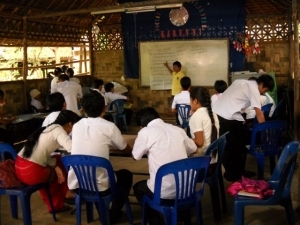Karenni Further Study Program (2010)

August 1, 2010
This project will enable 45 refugee students, aged 16 to 21, to attend the Karenni Further Study Program for the 2010-2011 school year, in Karenni Camp 2, Thai/Burma border. The Karenni Further Studies Programme (KnFSP) is a community-led initiative that was established to create a two year school program for young people aged 16-21, who do not have access to further education. The study program will provide a safe and enabling learning environment to develop the knowledge, skills and attitude of young people to value their education and assist in community building where ever they may be.
In refugee camps on the Thai/Burma border, access to higher education is basic and limited and previously there was no educational program available for young refugees in Karenni Camp 2. KnFSP was established by the community leaders to address this gap and provide opportunities for young refugees to improve their future prospects. Critically also, there was a need to train and develop new skilled community workers to replace those that have left through the current refugee resettlement program.
The students will receive education on community and social development work through a varied program including symposiums, work internships, leadership camp and community service outreach. The formal education will be carried out by 6 full time teachers and the program is supported by an advisory committee, mainly formed by Karenni community members. Graduates from the programme will be encouraged to take on leadership roles in education, health and management services within the camp community.
Additional Information
Karenni Further Studies Program is located in Ban Mae Surin (BMS), otherwise known as Karenni Site 2, in Amphur Khun Yuam, Mae Hong Son Province, Thailand and has a population of approximately 3,000 people. The ethnic composition is predominantly displaced Karenni from Burma in the last 20 years as a result of civil war between Burma dictator military government and Karenni resistance groups. KnFSP is the only education program that offers higher education in camp 2 and overall, 150 students are involved in the program, of which 50% are girls.
Results
During the last year, 51 students (2 levels: 33 students in level 1 and 18 students in level 2) were able to continue their education and acquire necessary knowledge and skills through this program. Students had annual 3-day Leadership Camp, conflict resolution training, organized competitions (Sport games, public speaking competitions) and internship opportunities for 2nd year students.
90% of first-year students passed the final exams while 19 out of 22 second-year students were granted a graduate certificate and 3 granted a completed certificate. All of their graduates gained employment with community based organizations within the camp.
Case Study
Makadalay is a twenty-year old Karenni who graduated from KnFSP last March with the highest result. During the internship period that all second-year students participated annually, Makadalay worked with the Karenni Education Department, assisting the office with operational activities as well as conducting her own research to better understand the education system in the camp, from nursery and kindergarten level to high school. Her outstanding performance and work ethics during the internship have resulted in an offer to join KnED as a full-time staff member right after graduation. Makadalay started working with KnED last May and is assigned to her first project as a trainer for kindergarten teachers in the camp.
“KnFSP is very important forour community because the students who graduated from here have self-confidence,experience and knowledge. KnFSP graduates are becoming prominent work force not only inthe refugee camp but also starting to serve their people inside Karenni State, Burma. Theyare both the present and the future”.
Chairperson Saw Hsar Htoo